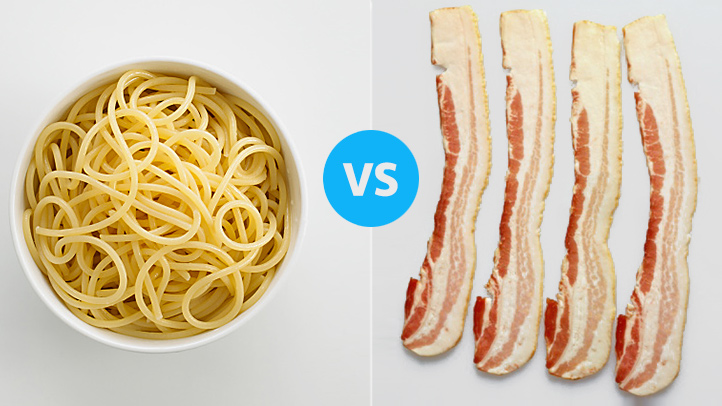Coming from a Bayesian background (and I highly recommend you look into the Bayesian PT Course if this type of stuff interests you), I tend to favor a higher fat approach in the majority of diets to optimize hormone function. But I always wondered to myself: am I secretly some carb hyper responder? Am I the second coming of Alberto Nunez? Was I leaving plenty of progress on the table by keeping carbs in a moderate range? You could also call this wishful thinking…
But the only way to find out for sure would be to actually test the impact of each macronutrient to find my own carb tolerance. What is Carb Tolerance? Before you get this confused with “insulin sensitivity,” realize that while the two are related, insulin sensitivity only explains half the story. And if you had no idea what either of these terms meant, well then welcome to the party! Allow me to backtrack and give you the 3,000-foot view of what insulin is in the first place. Insulin is a storage hormone that, in most individuals, is secreted by the pancreas in response to ingesting certain nutrients. Essentially, the secretion of insulin sends the message to your body that your are in a fed state and goes about storing the substrates that are currently in the bloodstream for later use (i.e. amino acids in the blood can be taken up by muscle tissue for repair, and glucose can be stored as glycogen for later use). Most people think that carbs are the only thing that impacts insulin levels, as insulin is secreted in response to the blood glucose produced by ingesting carbs. While this is true, this isn’t the whole story: insulin is also secreted following protein ingestion (1). This is an important distinction, because many people fail to realize it. They quickly assume insulin only reacts to carb intake, equate insulin levels to blood glucose levels, and associate all of the evils of (chronically) high blood glucose with high insulin levels. I think this is where the idea was born that fat loss will be easier when you keep insulin low by restricting carbs. Newsflash: if you’re eating enough protein, you’re secreting plenty of insulin. In fact, insulin levels and blood glucose levels are not one and the same, and acute secretions of insulin can have multiple beneficial effects. I strongly recommend everyone go and read James Krieger’s series on “Insulin’s Underserved Bad Reputation” (2) to get a better grip on this whole concept. People also think that since insulin temporarily shuts down fat burning and that any insulin will immediately make you store more blubber than a whale. This is beyond the scope of this post, but understand that this is also not true, that you can still store fat while insulin is low, and reference Krieger’s work above to find out why. ANYWAYS, where was I… Insulin sensitivity essentially puts a measure on how well your body reacts to insulin. If you objectively seem to function better on a higher carb intake, then, some people might be quick to tell you that you “have high insulin sensitivity, bro”. If you follow main stream fitness advice, you’d believe you just struck the Holy Grail of maintaining a lean body composition. But what many bros and broettes fail to realize is that insulin sensitivity ALONE doesn’t impact body composition all that much (3). There’s another side to this story, and that side is insulin secretion. These two factors must align to have a significant impact on body composition, and it is these two factors together that constitute carb tolerance (4). You can have mismatches, such as insulin resistance but high insulin secretion. In this case, you’d actually want to keep carbs high, since it’s going to take a lot of insulin to do it’s job in a resistant individual. On the flip side, someone can have high insulin sensitivity but also secret high amounts of insulin. This would likely have a negative impact on body composition, because excessive insulin (especially without a training stimulus) can lead to fat storage. So what do we really care about finding here? If the insulin secretion is APPROPRIATE for your sensitivity, and to make dietary recommendations off of that. How do we do this? A few days of testing can do the trick. Testing Tolerance By skillfully altering the composition of a meal (pre-training meal, for the sake of convenience and better indicator of impacts on performance), you can test your individual response of both low-carb and low-fat meals and pit the results against each other to get a better gauge of carb tolerance. Be aware that the vast majority of people are going to have average carb tolerance, meaning they’ll have a neutral response and could get by with either protocol in the context of their daily macronutrients. The next most likely scenario would be carb “intolerance,” where a high carb meal would leave the individual with a decrease in mental acuity and the classic “carb coma.” Last in line would be the hyper responders; the group I secretly hope to belong to, the group that can pound carbs and be better off for it. In order to test this accurately, you’ll need to keep many variables constant across multiple days while manipulating your single meal (a BIG one here being sleep!). You should also realize that carb intake alone generally has a beneficial effect on mood thanks to serotonin and dopamine. Be careful to assess practical measures only, like performance, and not something like mood. Here’s how I set up my protocol over the course of four days. It’s worth noting that across all days, my pre workout meal came ~3 hours before my training, and also worth noting that I’m no stranger to a higher-fat approach to my pre workout meal. My typical meal looks more like days 1 & 2 rather than 3 & 4. Days 1 & 2 High fat, low carb breakfast (3 eggs, green vegetable and a protein shake), followed by a high fat, low carb pre training meal (in this case, 1/4 lb ground turkey and 1/4 lb ground beef. So flashy and elegant, right?). 26 g fat, 0 g carb, 43 g protein (406 kcal). Following training, I’d fill my daily macros accordingly, favoring protein and carbs. Days 3 & 4 Same breakfast, but now my pre training meal becomes low/no fat, high carb. Care should be taken to match the satiety impact of both types of meals across days, because the feeling of fullness can be mistaken for a positive impact of a higher fat meal. In this case, I used white rice and chicken since there wasn’t too much disparity, according to the satiety index. In order to keep the meal iso-caloric, I equated protein intake (43 g) and had room for roughly 59 g carbs (26*9/4). I tried my best to keep the servings to equate to about 60 g carbs, but may have been over by a gram or two. Results So how did I fare? On day one, I noticed a bit of extra lethargy near the tail end of my training session, which was roughly and hour long for a full-body routine. I also noticed a little bit more hunger than usual, but that could be due to the fact that my pre workout meal is usually slightly larger and contains a little more fiber than my testing protocol. But I did manage to set a few personal bests in lifts for my current training cycle. Day two was more of the same: a little dip in energy near the end of the lift, but a few PRs led to a happy Joe. Heading into the second set of days, here’s what I expected: slightly more sustainable energy, but similar performance with a high carb meal. Lo and behold, that’s basically all that happened. My mood was slightly elevated, and my energy was higher near the tail end of the workout, but it didn’t necessarily correlate with markedly higher strength or performance. A PR or 2 over the carb-meal days was basically equal to the PR or 2 I had over the previous fat-meal days. Alas, I am not the second coming of Alberto Nunez, and I seem to be “metabolically flexible” enough to perform well on either type of meal, mood/energy aside. So what’s my takeaway here? I don’t necessarily have to fret over the composition of my pre-workout meal, since I seem to perform the same on either type (and would expect a mixed meal to deliver the best of both worlds in terms of energy and performance). It also lets me know that if improved mood or well-being has ANY positive impact on performance, I may as well not shy away from carbs in this meal because there’s no negative to doing so from a fat-loss perspective. Tl;Dr - Carbs aren’t inherently evil, and I can perform well with or without them. It’s up to you to see if you respond the same way. In-Text Citations (1) https://nutritionandmetabolism.biomedcentral.com/articles/10.1186/1743-7075-9-48 (2) http://weightology.net/weightologyweekly/index.php/free-content/free-content/volume-1-issue-7-insulin-and-thinking-better/insulin-an-undeserved-bad-reputation/ (3) http://onlinelibrary.wiley.com/doi/10.1038/oby.2010.274/full (4) http://care.diabetesjournals.org/content/28/12/2939.full
0 Comments
Leave a Reply. |
Categories
All
DisclaimerThe techniques, strategies, and suggestions expressed in this website are intended to be used for educational and entertainment purposes only. The author is not rendering medical advice of any kind, nor is this website intended to replace medical advice, nor to diagnose, prescribe or treat any disease, condition, illness or injury. |


